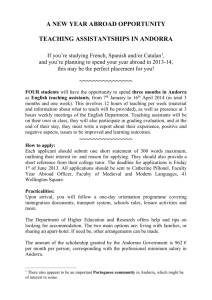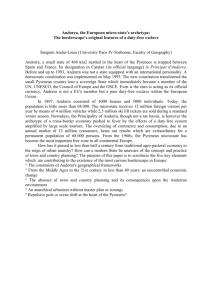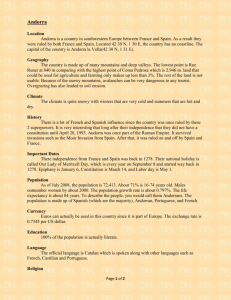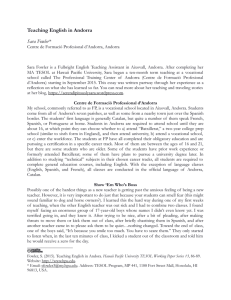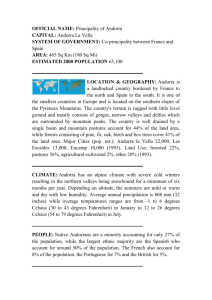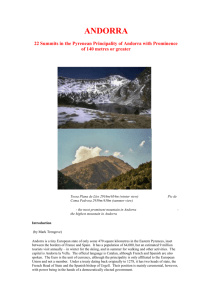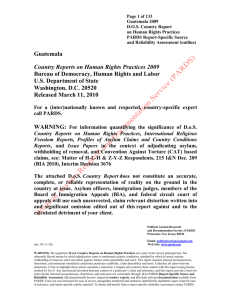July 26, 2005
advertisement
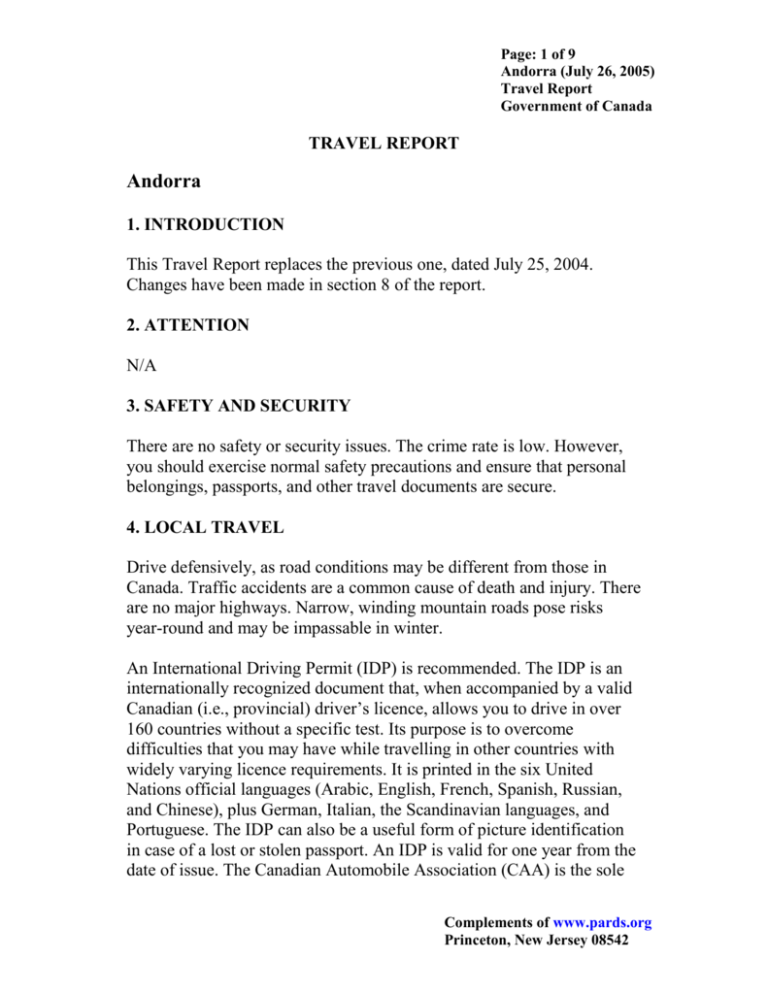
Page: 1 of 9 Andorra (July 26, 2005) Travel Report Government of Canada TRAVEL REPORT Andorra 1. INTRODUCTION This Travel Report replaces the previous one, dated July 25, 2004. Changes have been made in section 8 of the report. 2. ATTENTION N/A 3. SAFETY AND SECURITY There are no safety or security issues. The crime rate is low. However, you should exercise normal safety precautions and ensure that personal belongings, passports, and other travel documents are secure. 4. LOCAL TRAVEL Drive defensively, as road conditions may be different from those in Canada. Traffic accidents are a common cause of death and injury. There are no major highways. Narrow, winding mountain roads pose risks year-round and may be impassable in winter. An International Driving Permit (IDP) is recommended. The IDP is an internationally recognized document that, when accompanied by a valid Canadian (i.e., provincial) driver’s licence, allows you to drive in over 160 countries without a specific test. Its purpose is to overcome difficulties that you may have while travelling in other countries with widely varying licence requirements. It is printed in the six United Nations official languages (Arabic, English, French, Spanish, Russian, and Chinese), plus German, Italian, the Scandinavian languages, and Portuguese. The IDP can also be a useful form of picture identification in case of a lost or stolen passport. An IDP is valid for one year from the date of issue. The Canadian Automobile Association (CAA) is the sole Complements of www.pards.org Princeton, New Jersey 08542 Page: 2 of 9 Andorra (July 26, 2005) Travel Report Government of Canada issuer of the IDP in Canada. 5. NATURAL DISASTERS AND CLIMATE Avalanches present a risk. The weather in mountainous areas is highly unpredictable. If you are planning a mountaineering or skiing holiday, you are advised to visit the Ski Andorra Web site for information on weather and safety conditions. Canadians should know the address and telephone number of the Embassy of Canada in Madrid, Spain (see below), in the event of an emergency. 6. LOCAL LAWS AND CUSTOMS You are subject to local laws. A serious violation may lead to a jail sentence. The sentence will be served in local prisons. However, Canada and Andorra are signatories to the European Convention on the Transfer of Sentenced Persons, which enables a Canadian imprisoned in Andorra to request to be transferred to Canada to complete the sentence in a Canadian prison. The transfer requires the agreement of both Canadian and Andorran authorities. Canadians arrested or detained have the right to contact the responsible Canadian government office (embassy, high commission, etc.) listed below. Arresting officials have a responsibility to assist you in doing so. Canadian consular officials can provide a list of local lawyers upon request. Foreign Affairs Canada publishes a booklet, A Guide for Canadians Imprisoned Abroad, specifically targeted at incarcerated Canadians. Its prime objective is to inform Canadian detainees, their families, and friends about available assistance and advice. Andorran authorities practise zero tolerance with respect to possession, use, and trafficking of illegal drugs. Andorra is not a member of the European Union and purchases of duty free tobacco, liquor, and luxury goods are subject to taxes and duties on Complements of www.pards.org Princeton, New Jersey 08542 Page: 3 of 9 Andorra (July 26, 2005) Travel Report Government of Canada re-entering European Union countries. France and Spain apply strict rules on the amount of tobacco imported from Andorra for personal use. Canadians should contact the Embassy of the Principality of Andorra in New York (see below) for specific information regarding customs requirements. 7. ASSISTANCE FOR CANADIANS ABROAD There is no resident Canadian government office in Andorra. You can obtain consular assistance and further information at the following address: Spain - MADRID, Embassy of Canada Address: Goya Building, 35 Nuñez de Balboa Postal Address: P.O. Box 587, 28080 Madrid, 28001, Spain Tel.: 34 (914) 233-250 Fax: 34 (914) 233-251 E-mail: mdrid@international.gc.ca/ Internet: http://www.canada-es.org Canadians should register with the Embassy of Canada in Madrid if they are going to be in Andorra for longer than three months. Registration can be done on-line. Please complete all the required fields. Once you leave the country, please advise the Embassy of Canada in Madrid in order to ensure that the list of Canadians in Andorra is accurate. For emergency assistance after hours, call the Canadian Embassy in Madrid and follow the instructions. You may also call the Department in Ottawa at 613-996-8885. 8. ENTRY/EXIT REQUIREMENTS It is the sole prerogative of each country to determine who is allowed to enter. All countries have special requirements for persons intending to reside for extended periods (usually more than 90 days) or who plan to work, study, or engage in non-tourist activities. To obtain information on specific entry requirements, contact the nearest diplomatic or Complements of www.pards.org Princeton, New Jersey 08542 Page: 4 of 9 Andorra (July 26, 2005) Travel Report Government of Canada consular office of the country or countries to be visited. Conditions are subject to change. Selling, altering, or allowing another person to use your passport is a criminal offence. It could lead to the laying of charges and imprisonment if convicted. It could also lead to the denial of future passport services. Any adult travelling with children may be required to show evidence of parental/custodial and/or access rights. Foreign and Canadian authorities may also require evidence that the adult has the consent of the parents, legal guardian, and/or the court to travel with the children. Some countries may not permit children to enter or, in some cases, leave the country without proper documentation such as a letter of consent or a court order. A valid Canadian passport is required for Canadians intending to visit Andorra. The passport should be valid for at least six months beyond the date of your expected departure from the country. Tourist Visa: Not required Business Visa: Not required Student Visa: Not required (for stays less than 90 days) Special and diplomatic passport holders should verify visa requirements for this and other countries, as they may differ from those that apply to regular passport holders. Although same-sex marriages are legal in Canada, many countries do not recognize them. Attempting to enter as a same-sex married couple may result in refusal by local officials. For more information, contact the foreign government office accredited to Canada. Foreign Affairs Canada’s Office of Protocol provides contact details for the Embassy of the Principality of Andorra, where you can obtain further information on entry and exit requirements. Complements of www.pards.org Princeton, New Jersey 08542 Page: 5 of 9 Andorra (July 26, 2005) Travel Report Government of Canada 9. MONEY The common currency is the euro (EUR). Check with your bank for information on ATM services in other countries. You can also check the VISA ATM locator page or the MasterCard ATM locator page for the addresses of ATMs around the world. Your bank can advise if you need a new personal identification number (PIN) for overseas access to your account. Credit cards and debit cards should be used with caution due to the potential for fraud and other criminal activity. ATMs should be used during business hours inside a bank, supermarket, or large commercial building. Leave copies of your card numbers with a family member in case of emergency. 10. GENERAL INFORMATION Andorra (capital: Andorra la Vella) is a small landlocked country in southwestern Europe, between France and Spain. Tourism is the mainstay of the economy, and facilities and services are excellent. The only routes into Andorra are overland from France or Spain. The official language is Catalan. French and Spanish are also widely spoken. Radio Canada International (RCI) broadcasts on shortwave to this country. For a schedule of times and frequency of broadcasts, check the RCI Web site. You may also e-mail RCI at info@rcinet.ca or call 514597-7500. 11. TRAVEL MEDICINE PROGRAM The Public Health Agency of Canada and the World Health Organization (WHO) report on disease outbreaks that occur throughout the world. For the latest travel health advisories and related information, visit the Public Health Agency of Canada’s Travel Medicine Program Web site. The Public health Agency of Canada strongly recommends that your travel plans include contacting a travel medicine clinic or physician six to eight weeks before departure. Based on your individual risk Complements of www.pards.org Princeton, New Jersey 08542 Page: 6 of 9 Andorra (July 26, 2005) Travel Report Government of Canada assessment, a health care professional can determine your need for immunizations and/or preventive medication and advise you on precautions to avoid disease. Travellers are reminded to ensure that their routine (childhood) immunizations (e.g., tetanus, diphtheria, polio, and measles) are up to date. Standards of medical care may differ from those in Canada. Treatment may be expensive, and payment in advance may be required. Travellers are advised to arrange for medical insurance prior to departure. Prescription medications should be kept in the original container and packed in carry-on luggage. The Public Health Agency of Canada also recommends that travellers who become sick or feel unwell on their return to Canada seek a medical assessment with their personal physician. Travellers should inform their physician that they have been travelling or living outside of Canada. 12. ADDITIONAL HEALTH INFORMATION Good medical care is widely available. 13. RETURNING TO CANADA Declare everything acquired abroad, whether purchases for yourself or gifts, as well as goods bought at a Canadian or foreign duty-free store. Keep original receipts. Certain items are restricted from entering Canada. If you are considering importing meat or dairy products, plants, vehicles, weapons, cultural property, endangered species or products derived from them, obtain more information from the Canada Border Services Agency, the Canada Firearms Centre, Canadian Heritage, or the office of CITES (Convention on International Trade in Endangered Species of Wild Fauna and Flora). The booklet I Declare describes what you can and cannot bring back to Canada if you have been away for less than a year. Transportation companies, such as airlines and rail and bus services, are required to ensure that all passengers that they bring to Canada have satisfactory evidence of their identity and status in Canada, if any. For Complements of www.pards.org Princeton, New Jersey 08542 Page: 7 of 9 Andorra (July 26, 2005) Travel Report Government of Canada international travel purposes, the Canadian Certificate of Citizenship (citizenship card) accompanied by a non-Canadian passport is not reliable evidence that the holder is a Canadian citizen. A passport is the only reliable and universally accepted identification document. It proves that you have a right to return to Canada. Due to increased scrutiny of international travellers by airlines and immigration authorities around the world, Canadian citizens are strongly advised to obtain a Canadian passport prior to initiating travel. Canadian citizens who do not hold a valid Canadian passport should contact the nearest Canadian government office abroad to apply for one. 14. INTERNATIONAL ADOPTIONS Adoption by foreigners is almost impossible in Andorra. Provincial and territorial authorities in Canada are responsible for authorizing international adoptions. If you are thinking of adopting a child from another country, you must first obtain information about the adoption regulations of the province or territory in which the child will reside. While adoption is a provincial/territorial responsibility, Citizenship and Immigration Canada (CIC) is responsible for allowing an adopted child entry into Canada. Entry can be refused if the child does not hold the appropriate immigrant visa. A visa may be denied, even if the adoption has already been completed. For more information contact CIC at 1 888 242-2100 (in Canada only), check the CIC Web site or contact your provincial or territorial government. 15. TRAVEL TIPS You should: a) carry a Canadian passport for all visits outside Canada; b) keep a photocopy of your passport’s identification page with you; c) carry passport, tickets, and money separately; d) keep personal belongings and passports safe and carry only enough money for anticipated expenses; e) leave a copy of your itinerary and proof of citizenship with family Complements of www.pards.org Princeton, New Jersey 08542 Page: 8 of 9 Andorra (July 26, 2005) Travel Report Government of Canada and/or friends; f) carry legally certified documentation signed by both parents permitting a child under 18 to travel alone or with an adult (i.e., a relative or teacher), or carry legally certified documentation from the absent parent if only one parent escorts the child, in addition to a copy of any separation or divorce decree or death certificate; and g) not visit unknown or isolated areas without first obtaining information or assistance. 16. HEALTH AND TRAVEL INSURANCE Do not rely on your provincial health plan to cover all expenses if you get sick or are injured while abroad. It may cover nothing or only a portion of the costs. Understand the terms of your supplementary insurance policy. Some credit cards offer their holders health and travel insurance. Do not assume the card alone provides adequate coverage. Carry details of your insurance with you. Also, tell your travel agent, a friend or relative, and/or travelling companion how to contact your insurer. Get a detailed invoice from the doctor or hospital before you leave the country. Always submit original receipts for any medical services or prescriptions received abroad. Most insurance companies will not accept copies or faxes. Cancelling a scheduled trip abroad could cost you money. Before cancelling a scheduled trip, you should discuss the matter with your travel agent, your travel insurer, or the airline. The decision to travel is the sole responsibility of the traveller. 17. FOR MORE INFORMATION The Consular Affairs Bureau of Foreign Affairs Canada provides: (a) Country Travel Reports detailing safety and security conditions, health advice, and entry requirements; (b) information on Current Issues highlighting current and ongoing situations around the world; (c) daily email Travel Updates notifying you of changes to our Current Issues and Country Travel Reports; (d) a series of free safe-travel publications to help travellers prepare for a safe and problem-free journey; and (e) Complements of www.pards.org Princeton, New Jersey 08542 Page: 9 of 9 Andorra (July 26, 2005) Travel Report Government of Canada Country Profiles for over 200 destinations, which include links (when available) to Canadian government offices abroad and information on individual countries and trade and investment. For additional information, you may contact the Consular Affairs Bureau by telephone: 1 800 267-6788 or 613-944-6788; e-mail: voyage@international.gc.ca; Web site: www.voyage.gc.ca/consular_home-en.asp; and TTY: 613-944-1310 or 1 800 394-3472 (in Canada and the U.S.). Specific information may also be obtained from a consular representative by contacting Canadian government offices abroad. 18. ANNEX N/A Complements of Political Asylum Research and Documentation Service (PARDS) LLC 145 Witherspoon Street Princeton, New Jersey 08542 www.pards.org Phone: 1 (609) 497 – 7663 politicalasylum@gmail.com Internal File: Andorra(TravelReport)Canada(July26,2005) Complements of www.pards.org Princeton, New Jersey 08542
